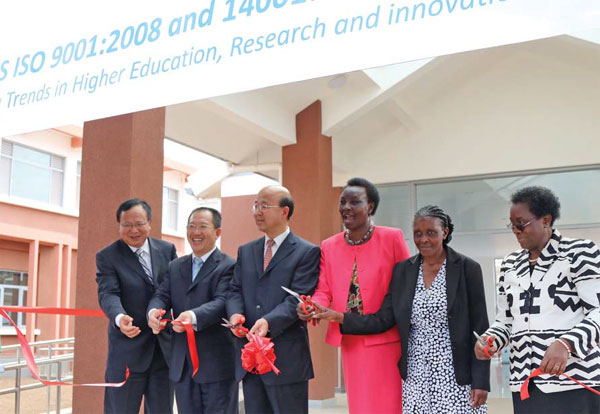Research aims to preserve continent's natural riches
Updated: 2016-10-07 07:49
By Edith Mutethya(China Daily Europe)
|
|||||||||
Africa's efforts to preserve its biodiversity will soon get a major boost, thanks to a Chinese-funded joint project.
The Sino-Africa Joint Research Center Project will be fully operational in December.
Hosted by one of the leading Kenyan academic institutions, Jomo Kenyatta University of Agriculture and Technology, the research center will serve as a hub of Sino-African cooperation in biodiversity-related research, aimed at solving the challenges of protecting the continent's plants, animals, fungi and microbes.
The research center comprises specialist research facilities, including laboratories, a herbarium and greenhouses; administration offices, as well as conference and accommodation facilities.
|
Liu Xianfa (third from left), the Chinese ambassador to Kenya, and Mabel Imbuga (right), vice-chancellor of Jomo Kenyatta University of Agriculture and Technology at the opening ceremony for the Sino-Africa Joint Research Center. Liu Hongjie / China Daily |
African and Chinese scientists will jointly carry out research, mainly focusing on conservation, geographic and remote sensing, development of natural products, agricultural science and technology, microbiology and molecular biology. The project, which is a collaboration between the university and the Chinese Academy of Sciences, also has a botanical garden with seven thematic sections, among them an African garden, a medicinal garden, an orchard garden and an Asian exotic garden.
According to Mabel Imbuga, vice-chancellor of the Kenyan university, the aim of the gardens is to create a recreation center for the communities around the university as well as serve as a platform to inform and educate the public on the importance of conserving species.
Africa is rich in biodiversity. Its living organisms, according to United Nations Environmental Program, comprise around one-fourth of global biodiversity and it supports the earth's largest intact assemblages of large mammals.
The continent's biomes extend from mangroves to deserts, Mediterranean to tropical forests, temperate to subtropical and montane grasslands and savannahs, as well as ice-capped mountains.
However, biodiversity has been experiencing rapid and alarming degradation as a result of socioeconomic factors such as overpopulation and overexploitation.
Researchers meeting in Cameroon in 2014 reportedly warned that Africa could lose up to 30 percent of its animals and plant species by the end of the century, owing to global warming, population growth and unregulated development.
The research center, the first of its kind in Africa, is expected to help the continent preserve its endangered biodiversity.
The center will also include an agriculture demonstration zone to showcase modern agricultural techniques, especially in the management of dry lands, which constitute a large part of Kenya.
"This is critical in the fight against food insecurity in the country, considering the current effect of climate change on plant and animal population dynamics," says Imbuga.
Since the start of the project, which occupies 16 hectares, she says a great deal of technology has been transferred from the Chinese to the Kenyans. The Chinese have also trained several employees at Jomo Kenyatta University, who will work in the labs alongside them.
Robert Gituru at the university says his aspiration is to see a significant improvement in conservation.
"My dream is that we will not be remembered by posterity as the generation that destroyed biodiversity, but as people who protected and stood for biodiversity and preserved it for the sake of future generations," he says.
To achieve this, he says, he will encourage continued collaboration between the Chinese and African researchers.
"I'm confident that we have the brains from both sides to move not just Kenya, but the entire continent forward in terms of biodiversity conservation and food security," he says.
Gituru says plans are underway to bring endangered flora from all over Kenya and plant them in what will be called the County Corner. The response from the country's 47 counties has been tremendous.
"Some trees have great pharmaceutical value so we cannot afford to lose them," he says.
There will be a small charge for people to access the garden, which will go toward its upkeep and maintenance, but Gituru says the bottom line is to provide a platform for people to learn about biodiversity especially younger people, who are the future of the nation.
"It's surprising that many young people in the country don't know the names of trees in their mother tongue. This is where they will get the opportunity to learn the names and functions of the trees."
Dan Kiambi, senior lecturer in the botany department at the university says the project, which he describes as magnificent and well planned, will play a key role in improving the agricultural sector.
"Since laboratories will be used for molecular studies, it will help in unlocking the potential of many indigenous crops, especially vegetables. We need to study them and know their economic potential. This will help in developing and improving their varieties," he says.
Gituru and Wang Qingfeng of Wuhan Botanical Garden at the Chinese Academy of Sciences are the brains behind the project.
edithmutethya@chinadaily.com.cn
(China Daily European Weekly 10/07/2016 page26)
Today's Top News
President Xi encourages more investment in Portugal
France angry with Poland after it scraps Airbus deal
Pound plunges 6% in Asian trade on Brexit fear
Public holidays a profitable industry
Theresa May shifts her party toward the center
Security Council agrees on Guterres as next UN chief
Rudd says immigration speech not racist
West may be best for nation's teenagers
Hot Topics
Lunar probe , China growth forecasts, Emission rules get tougher, China seen through 'colored lens', International board,
Editor's Picks

|

|

|

|

|

|








